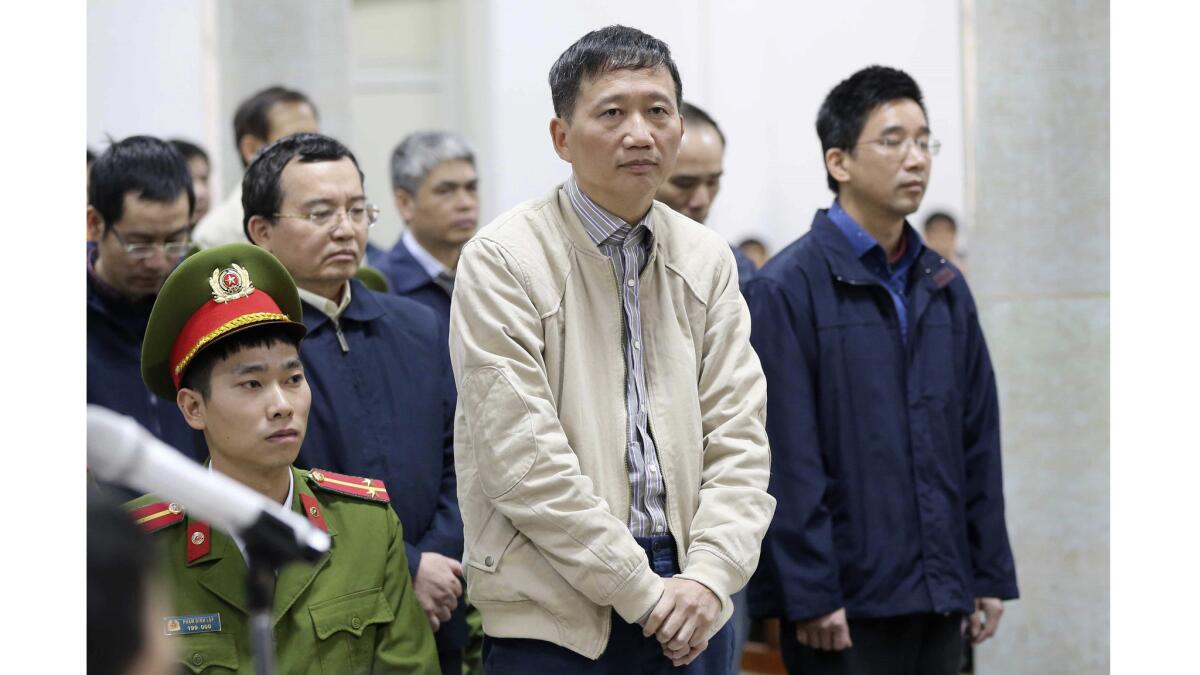Vietnam’s corruption crackdown is targeting the powerful. Has it gone too far?

Reporting from Beijing — The world learned of Vietnam’s anti-corruption drive on a warm summer day in Berlin, when park goers reportedly watched as agents crammed a Vietnamese oil executive into a car.
Germany accused the Vietnamese Embassy of helping kidnap Trinh Xuan Thanh, former chairman of a construction company tied to state energy giant PetroVietnam. Vietnamese officials say he returned home voluntarily after a year on the run.
The controversy demonstrated the lengths to which Vietnam would go in its pursuit of high-level graft. Thanh now stands trial — alongside the most senior Communist Party official to face prosecution in decades — on corruption charges that have ensnared Vietnam’s banking and energy sectors and exposed layers of deceit inside state-run companies.
Communist Party chief Nguyen Phu Trong last month called such efforts “unprecedented.”
This crackdown underscores the party’s desire to maintain its legitimacy. But it’s also spurred accusations of a deeper, more insidious power struggle over one of the world’s fastest growing economies.
Here’s what you need to know about a campaign that’s captured the attention of Vietnamese around the world:
Twenty-two defendants, including Thanh and Dinh La Thang, a former Politburo member and PetroVietnam chairman. The National Assembly fired Thang last year as party chief of Ho Chi Minh City, formerly Saigon, the country’s lively financial hub. He’s the most high-level official to stand trial since the 1970s.
Thang, once a rising star in the party, faces more than a decade in prison for mismanaging tens of millions of dollars in PetroVietnam investments. Thanh, charged with embezzlement, could receive life imprisonment.
The other 20 defendants include three former chairmen of PetroVietnam, the country’s largest oil producer and a sprawling state enterprise that owns stakes in assets from banks to power plants.
Such incidents occur with increasing frequency. Nearly 50 bankers and executives currently stand trial more than 900 miles south in Ho Chi Minh City. Last summer, judges sentenced a former PetroVietnam head to death for embezzlement and abuse of power in a trial that involved 51 people.
Thang and other prominent defendants were close to former Prime Minister Nguyen Tan Dung, who lost a 2016 bid for party chief. Lawmakers instead gave Trong, the incumbent party chief, special permission to extend his post.
“The question is what do these trials mean, not simply for corruption per se, but for the direction of Vietnamese politics and the way in which the party operates the state?” said Jonathan London, a lecturer at Leiden University in the Netherlands, who studies contemporary Vietnam.
“Many people in Vietnam perceive what is occurring as not just an anti-corruption campaign, but a political purge.”
Corruption pervades this country of 93 million. It filters up from the traffic cop at the roundabout to the principal who enrolls a student based on the thickness of his gift envelope.
Vietnam ranked 113th out of 176 countries in Transparency International’s 2016 corruption index, just below Egypt and ahead of Pakistan and North Korea.
The anti-corruption drive took off after the former prime minister left office. Dung, 68, helped integrate Vietnam into the global economy, but he also drew criticism for his family’s ties to powerful state businesses. His rival, 73-year-old Trong, is a modest party ideologue more focused on old-school collective leadership.
Vietnamese officials reject any links between political infighting and the graft campaign. The government advocates “dealing with wrongdoings and corruption,” Foreign Ministry spokeswoman Le Thi Thu Hang said in September.
Authorities haven’t just gone after greedy executives for graft; they’ve arrested bloggers and activists for anti-state views. In one of the more high-profile cases last June, Facebook blogger Nguyen Ngoc Nhu Quynh — also known as Mother Mushroom — was sentenced to a decade in prison for “conducting anti-state propaganda.” She wrote about human rights and environmental mismanagement.
The corruption campaign has focused on positions of financial influence. Just days ago, police arrested real estate developer Phan Van Anh Vu for revealing state secrets. The tycoon, who also worked as a senior officer in Vietnam’s intelligence service, was arrested after he slipped into Singapore using a fake ID.
Not everyone views the campaign as a tale of competing factions. Officials are serious about cleaning up extravagance permitted under Dung, said Carlyle Thayer, a professor emeritus at the Australian Defense Force Academy in Canberra, who has studied Vietnam for more than three decades.
“If people flourished under the former prime minister and engaged in corruption, they are the targets of corruption,” he said. “This is politics as usual.”
The country’s anti-corruption drive resembles its northern neighbor’s. Early in his administration, Chinese President Xi Jinping vowed to root out both “tigers” and “flies” in an attempt to eviscerate a tumor eroding society. His effort, while widely supported, also sidelined political rivals.
Vietnam, which shares a tangled and tense relationship with its Communist comrade, watched closely. In China, Xi unilaterally leads the charge. In Vietnam, where no single leader wields as much control, numerous lawmakers oversee it.
The Southeast Asian country’s current campaign — perhaps to its detriment — only targets the top.
If the leaders “keep following the current process, I don’t think they will perform something that better helps Vietnam be more integrated and have more transparency,” said Ha Hoang Hop, chairman of Think Tank Viet Know, a consulting firm in Hanoi.
Germany expelled two diplomats for the Berlin incident, which strained relations and threatens to blow up a trade deal between Vietnam and the European Union. Many Vietnamese view the trials with ambivalence. They question whether the crackdown will ever trickle down to that traffic cop.
“Private sector corruption in comparison to the state is very big, and it’s untouched,” Hop said. “I don’t see that it will be a better future.”
ALSO
Trump visits Vietnam after helping to reopen old war wounds at home
In Mekong Delta backwaters, Vietnam vets find peace in a town that war destroyed
China’s heralded ‘solar highway’ closed after thieves stole one of the panels
Meyers is a special correspondent.
Twitter: @jessicameyers
ALSO
In Mekong Delta backwaters, Vietnam vets finds peace tin a town that war destroyed
Born in America, Sriracha sauce tries its luck in Vietnam
More to Read
Sign up for Essential California
The most important California stories and recommendations in your inbox every morning.
You may occasionally receive promotional content from the Los Angeles Times.










